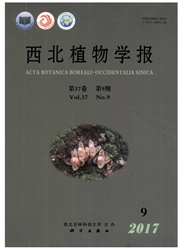

 中文摘要:
中文摘要:
生态系统转换影响土壤有机碳的动态、循环及环境质量.本研究分析了子午岭林区农田、草地、灌丛和森林不同生态系统土壤总有机碳、活性有机碳和稳定性有机碳含量.结果显示:各生态系统中,表层(0~10 cm)土壤总有机碳含量显著高于深层土壤(40~70 cm).与农田生态系统表层土壤相比,草地、灌丛、森林生态系统土壤总有机碳含量分别增加82.07%、121.67%和183.16%,深层土壤有机碳含量也有类似的趋势;从增加的绝对值来看,表层土壤活性有机碳含量分别增加2.24、4.13和5.43 g/kg,土壤稳定性有机碳含量分别增加4.76、6.23和10.18g/kg.表明农田生态系统转换为林、草生态系统,有利于土壤有机碳的积累.而且,土壤作为碳“汇”的功能增强,更有利于CO2固定和生态环境改善.
 英文摘要:
英文摘要:
Ecosystem conversion affects the dynamic change and cycle of soil organic carbon and environmental quality. The study examined the total contents of soil organic carbon and the content of soil active organic carbon and stable organic carbon in farmland ,grassland ,scrub and forest ecosystems. The results showed that in all the ecosystems,the total contents of soil organic carbon in 0-10 cm soil were significantly higher than those in deeper soil layer (40-70 cm). In topsoil,the contents of soil organic carbon in grassland ,scrub and forest ecosystems separately increased by 82.07%,121.67% and 183.16% compared with the total content of soil organic carbon in farmland ecosystem,and in deeper soil layers the total contents of soil organic carbon appeared to vary similarly ; The absolute contents of soil active organic carbon separately increased by 2.24 g/kg,4.13 g/kg and 5.43 g/kg and the absolute contents of stable organic carbon separately increased by 4.76 g/kg,6.23 g/kg and 10.18 g/kg. These indicated that the conversion of farmland system into forest and grassland ecosystems was favorable for the accumulation of soil organic carbon and much more favorable for carbon fixation and ecological environment improvement because it increased the capacity of soil functioning as a carbon sink.
 同期刊论文项目
同期刊论文项目
 同项目期刊论文
同项目期刊论文
 期刊信息
期刊信息
